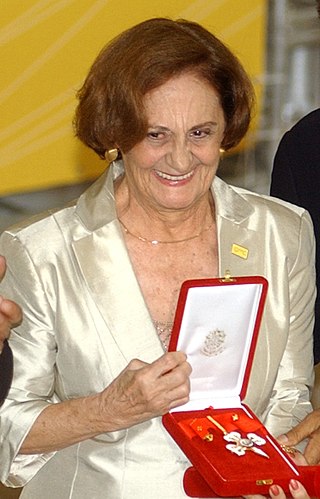
Maria Lucélia dos Santos is a Brazilian actress, director and producer. She received international acclaim for her leading role in the 1976 Rede Globo telenovela Isaura, The Slave Girl, broadcast in over 80 countries.

Maria da Graça Xuxa Meneghel is a Brazilian TV host, actress, singer, and businesswoman. Nicknamed "The Queen of Children", Xuxa built the largest Latin and Southern American children's entertainment empire. In the early 1990s, she presented television programs in Brazil, Argentina, Spain and the United States simultaneously, reaching around 100 million viewers daily. Xuxa has sold over 30 million copies of her records worldwide, which makes her the highest-selling Brazilian female singer. Her net worth was estimated at US$100 million in the early 1990s. Also successful as a businesswoman, she has the highest net worth of any Brazilian female entertainer, estimated at US$400 million.

The Sistema Brasileiro de Televisão is a Brazilian free-to-air television network founded on Wednesday, 19 August 1981, by the businessman and television personality Silvio Santos. The company was established after a public tender by the Brazilian Federal Government to form two new networks, created from revoked concessions of the defunct Tupi and Excelsior networks. The SBT was founded on the same day that the concession agreement was signed, and that the act was broadcast live by the network, so that this was his first program aired. Before acquiring the concessions of the four stations that were to form the SBT, Grupo Silvio Santos had since 1976 the concession of Rio de Janeiro's channel 11, known as TVS Rio de Janeiro, which was a fundamental step to give life to the SBT.

Skank was a Brazilian pop rock band from Belo Horizonte. Having begun in 1991, they sold approximately 5,200,000 copies of their albums as of 2004. Initially intending to mix dancehall with traditional Brazilian styles, later the band changed its sonority to music closer to Britpop and local movement Clube da Esquina. Their last concert was held on March 26, 2023, at Mineirão, in Belo Horizonte.

Dejan Petković is a Serbian football pundit and retired footballer. In his native country he is widely known under the nickname Rambo while in Brazil he is known as Pet. He played six times for the FR Yugoslavia, scoring one goal. Petković played for seven Brazilian clubs in his career, and was made an honorary consul of Serbia in Brazil.
Edílson da Silva Ferreira is a Brazilian football pundit and retired footballer who played as a forward.

The National Order of the Southern Cross is a Brazilian order of chivalry founded by Emperor Pedro I on 1 December 1822. The order aimed to commemorate the independence of Brazil and the coronation of Pedro I. The name derives from the geographical position of the country, under the constellation of the Southern Cross and also in memory of the name – Terra de Santa Cruz – given to Brazil following its first arrival by Europeans in 1500.
"Waters of March" is a Brazilian song composed by Antônio Carlos Jobim (1927–1994) in 1972. Jobim wrote both the Portuguese and English lyrics. The lyrics, originally written in Portuguese, do not tell a story, but rather present a series of images that form a collage; nearly every line starts with "É...". In 2001, "Águas de março" was named as the all-time best Brazilian song in a poll of more than 200 Brazilian journalists, musicians and other artists conducted by Brazil's leading daily newspaper, Folha de S.Paulo. It was also voted by the Brazilian edition of Rolling Stone as the second greatest Brazilian song.

Os Paralamas do Sucesso is a Brazilian rock band, formed in Seropédica, Rio de Janeiro, in the late 1970s. Its members since 1982 are Herbert Vianna, Bi Ribeiro (bass), and João Barone (drums). In its beginning, the band combined reggae and ska with rock, but later added horn arrangements and Latin rhythms.

Laura Cardoso, artistic name of Laurinda de Jesus Cardoso Balleroni OMC is a Brazilian actress. She is celebrated as one of the best and most well known Brazilian actresses of cinema, theater and television.

Zé Ramalho is a Brazilian composer and performer. Zé Ramalho has collaborated with various major Brazilian musicians, including Vanusa, Geraldo Azevedo and Alceu Valença.

The Brazil national under-20 football team, also known as Brazil Sub-20 or Seleção Sub-20, represents Brazil in association football at this age level and is controlled by the Brazilian Football Confederation (CBF).
The Brazil national futsal team represents Brazil in international futsal competitions. It is under the direction of the Brazilian Football Confederation (CBF). The team is considered to be the strongest in the world earning a record three straight championships in the FIFA Futsal World Cup. Brazil also holds a record eleven championship wins in the South American Futsal Championship also known as the Copa América de Futsal and five wins in the Taça América de Futsal. As of September 2024, Brazil is ranked first in the Futsal World Rankings. Brazil has played in all 10 FIFA Futsal World Cups and has finished in the top three nine times, reaching the finals seven times and winning six titles, which includes the recent Futsal World Cup in 2024. The team has the best overall performance in the World Cup competition both in proportional and absolute terms. As of 2024, Brazil has a winning record against every nation they have faced in their history, winning over 89% of the matches and losing 5% of them.

Guaribas is a municipality in the state of Piauí in the Northeast region of Brazil. Described as a "farming outpost five hours from the nearest paved, two-lane highway", Guaribas is considered one of the poorest municipalities in the country.
Osasco Voleibol Clube is a professional women's volleyball club, based in Osasco, São Paulo (state), Brazil. It includes volleyball teams for females of all ages, children through adult. Since the 2021-22 season the club plays under the name Osasco/São Cristóvão Saúde.

Bom Dia & Cia is a morning children's television show that aired on SBT from August 2, 1993 to April 1, 2022, It is the longest-running Brazilian children's television program.

Rouge is the self-titled debut studio album by Brazilian pop girl group of the same name, formed through the Popstars. It was released in August 19, 2002 by Columbia Records and Sony BMG. As executive producer, Rick Bonadio produced each of the fourteen tracks on the record. The album counts on nine versions of international songs and the participation of trio KLB in one of the tracks. Its music incorporates pop and dance-pop, in songs that talk about fame, love, domination and the power of dreams.

"Brilha la Luna" is a song by the Brazilian pop girl group Rouge, from their second studio album C'est La Vie (2003). The song was released by Columbia Records as the album's lead single on May 6, 2003. It was written and produced by Rick Bonadio, being a mix of dance-pop and zouk that is heavily influenced by Latin music. "Brilha la Luna" has verses in Spanish, and in many cases, Portuñol. The membrer Luciana Andrade sings lead on the verses and bridge with the other members singing only the high harmony on the pre-chorus and second chorus. After Andrade's departure the group, the verses sung by Luciana were sung by Karin Hils and Fantine Thó, respectively.

Xuxa no Mundo da Imaginação was a Brazilian children's television series hosted by Xuxa Meneghel at TV Globo, shown Monday through Friday between 28 October 2002 and 31 December 2004.















